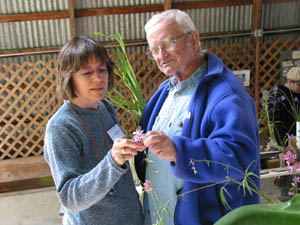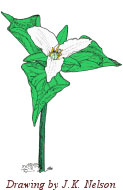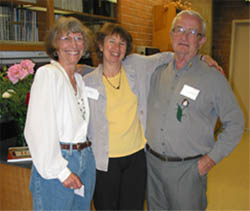|
Oral History - Julie Kierstead Nelson
|

Julie Kierstead Nelson with Freeman Rowe at the Mt. Pisgah Wildflower Show, Eugene, Oregon, 2004. Photograph by Gail Baker.
|
Julie Kierstead Nelson, forest botanist for the Shasta-Trinity National Forest, began her life-long interest in flowers and botany at Lane Community College in Eugene, Oregon. In her oral history interview of May 16, 2004, conducted at the Mt. Pisgah Wildflower Show, Julie talks about her experiences at Lane and the college's tradition of botanical education.
Excerpts from the oral history are printed below. Contact the college archivist for access to the recording and transcript of the interview.
At Lane Community College
A native of Coos Bay, Oregon, Julie was a student at Lane Community College 1973-1976. Jay Marston, Freeman Rowe, and Rhoda Love became her instructors, mentors, and colleagues.
I had started as an art major, with no background or particular interest in science or biology. And I went to registration at LCC not knowing what I was registering for and just eavesdropped on some other people that were in the registration area and heard a couple of people talking enthusiastically about Jay Marston as an instructor and this class that he was teaching about wild foods. So I thought what the heck, and I signed up for it, and was very quickly engaged by Jay's charisma, and one thing led to another and I ended up taking I think all of Jay's classes and then all of Freeman Rowe's classes because I got to know Freeman through Jay. And he's also a very charismatic figure.
About Jay Marston
He was very energetic, he was a very energetic person and a very animated lecturer and teacher. And I think most of his students would have just followed him anywhere. He was like the pied piper. He laughed a lot. And he was very good at creating lessons in his classes that were experiential rather than just talking to us.
About Freeman Rowe
Freeman is such a delightful person – I think of him kind of like an elf, he's like a sprite. He takes just such delight in the natural world and also in the people that he teaches and interacts with, and so he makes it fun and exciting to go out in the woods to look for mushrooms. He laughs a lot and doesn't take himself very seriously. And he gets people out, he gets people outdoors, to where we got to see these marvelous things. And he'd always have some interesting tidbit to tell us about this particular mushroom, about how it glows in the dark or if you peel off the slimy outside of it it's really quite tasty. Just lots of information tidbits. And I know I'm an information junky, and I think a lot of people around him are information junkies, too. So he's full of information and the way that he imparts it is delightfully fun.
About Rhoda Love
[When I was at Lane, Rhoda Love] was teaching Botany at the time, and I interacted with her because I was working and she was teaching. But I never did take a class from her. I stayed acquainted with her later when I was at Oregon State and she was involved there. ... Rhoda ...went back to school at the University of Oregon to get her PhD doing a dissertation on hawthorn's and so I had some interaction with her when she came up to the Herbarium [at OSU]. And also we were both pretty heavily involved in the Native Plant Society [of Oregon] at that point and so I got to know Rhoda through NPSO, and less as a teacher than as a fellow NPSO member.
Botany & Art
Julie was able to combine her talents as an artist with botany. She produced botanical illustrations that continue to be used in current botany and biology courses at LCC.
 Julie describes her classes at Lane and talks about art. (MP3, 1:24 min, 1.6MB.) Julie describes her classes at Lane and talks about art. (MP3, 1:24 min, 1.6MB.)
 I started out as an art major and discontinued that for one reason or another. But part of my interest in plants has been an aesthetic interest, because I think they are marvelously constructed and beautiful. I started out as an art major and discontinued that for one reason or another. But part of my interest in plants has been an aesthetic interest, because I think they are marvelously constructed and beautiful.
It was Jay's class that first required herbarium collection. And the next time the herbarium collection requirement came around in Freeman's class I asked him if I could draw some plants instead. ... I ended up doing a little field guide to the characteristics of plant families of western Oregon . He used that in his classes, and Jay used that in his classes. ... It was a little handout of plant family characteristics that would help beginning students to remember and recognize the characteristics of different plant families. So, what makes something in the lily family a lily and not an orchid. Or what makes something a mustard and not a figwort - that kind of thing. And so I got to indulge my interest in doing plant drawings and then I also wrote out the descriptive, distinctive characteristics. I was pleased to see that Gail Baker is still using that in her classes.
Collecting Specimens
Julie has contributed specimens to the Rowe-Love Herbarium at Lane.
I collected ... maybe 70 or 75 specimens [for the Lane Community College herbarium]. ... That was the beginning of my lifelong, so far, interest in plant identification. And I have retained an interest in herbaria and in collecting. I have a collecting book and I've collected probably a hundred specimens this year that will probably go to the University of California Herbarium . So it's remained an interest and something that I think is valuable for scientific documentation for the future.
Career and Awards
Julie received her BS in Botany from Oregon State University and MS from Northern Arizona University. She worked at the Berry Botanic Garden in Portland and started a program to conserve a seed bank for endangered northwest native plants. She became forest botanist for the Shasta-Trinity National Forest in northern California. Julie played an important role in the passage of the Oregon Endangered Species Act.
Julie was awarded the 2002 Karl Urban Celebrating Wildflowers Award. Karl Urban was a botanist in Pendleton, taught at Blue Mountain Community College, and served as forest botanist for the Umatilla National Forest.
This award was named in his honor to recognize someone from the United States who had been effective in promoting the enjoyment and conservation of native plants. And so I was thrilled to get this award, because I admire and remember Karl. ... I was given the award ... I don't think it was for any one thing. It was for publication of the book that I edited on rare plants of northern California, and the leadership of a group of northern California agency botanists that we call “An-bot” that has about twenty ad-hoc members, and for activity in the Native Plant Society, and for helping lobby for the endangered species act, the Oregon Endangered Species Act that was passed before I left Oregon.
Impact of LCC
 Julie talks about the impact of Lane on her life. (MP3, 1:28 min, 1.7MB.) Julie talks about the impact of Lane on her life. (MP3, 1:28 min, 1.7MB.)
Well, I certainly took away [from LCC] a love of botany, and a conviction that botany was really fun.... I took away a conviction that not only was botany fun, but that botanists were fun and were people that I wanted to know and be associated with. And I took away some philosophical underpinnings about botany – a kind of a pragmatic outlook and humanistic outlook about botany. That it's not about putting things in boxes or being snooty about the pronunciation. It's about relating the natural world to other people in a way that catches their interest and conveys a love and connection with the natural world. And I certainly took away a love of those people. And I hope I left behind a sense of love and appreciation of those people that were so important to my development as a human.

Rhoda Love, Gail Baker, Freeman Rowe, 2004. Photograph by Clay Gautier.
|
Contributions of Gail Baker and the Botany Program
 Julie talks about the contributions of the Lane Botany program. (MP3, 1:09 min, 1.3MB.) Julie talks about the contributions of the Lane Botany program. (MP3, 1:09 min, 1.3MB.)
Gail Baker is carrying on the tradition in a fine way that keeps the community engaged. That's been the wonderful gift of LCC's Biology Department - the degree to which the community, and that means all ages, not just people who come for course credit to transfer to a university. But the community part of the education program I think is just fabulously successful and spills over into all these wonderful community conservation and education efforts like this wildflower show and all of the various societies and the nature walks and the efforts to conserve local, small, special places. I think this LCC program has had a lot to do with producing a population in Eugene that is aware and enthusiastic - that goes out and does effective conservation. Because without the people there to impart this information, even the most well-meaning person just really wouldn't know what to do or where to start to do something worthwhile.
Summary of Interview
Length: 34:04 minutes
Location: Mt. Pisgah Arboretum, Eugene, Oregon
Interviewer: Elizabeth Uhlig, Archivist, Lane Community College
Time/Minutes |
Summary |
|
|
0:00 |
Introduction and background |
1:09 |
Decision to attend Lane Community College, registration, decision to take botany courses |
2:16 |
Classes at LCC with Jay Marston and Freeman Rowe |
4:19 |
Description of herbarium work and collecting specimens |
5:46 |
About Jay Marston |
8:19 |
Art and plants |
9:23 |
About Freeman Rowe, field work and field trips |
12:11 |
Herbarium work; interest in plant identification |
14:09 |
What she took from and gave to LCC |
16:00 |
Studies at Oregon State University |
18:15 |
Work with Rhoda Love at OSU |
19:09 |
Interest and work in the Great Basin in Oregon and Arizona |
21:22 |
Berry Botanic Garden ; work with seed conservation |
24:05 |
Plant description and collection |
25:10 |
Work as botanist with the Forest Service at Shasta-Trinity National Forest in northern California |
27:50 |
Karl Urban Celebration Award; recognition of her work |
30:17 |
Trip to Baja with Jay Marston in 1988 |
32:23 |
Gail Baker carrying on botany work at LCC; tradition of community involvement and education |
For a transcript of the oral history or to listen to the recorded interview, contact Lane Community Archives.
Related web sites:
-
Online Exhibits - web exhibits featuring photographs and excerpts from oral histories and other reminscences.
-
- Gail Baker Home Page - Biology/Botany instructor at Lane, includes links to local botanical organizations and events
|



 I started out as an art major and discontinued that for one reason or another. But part of my interest in plants has been an aesthetic interest, because I think they are marvelously constructed and beautiful.
I started out as an art major and discontinued that for one reason or another. But part of my interest in plants has been an aesthetic interest, because I think they are marvelously constructed and beautiful. 
